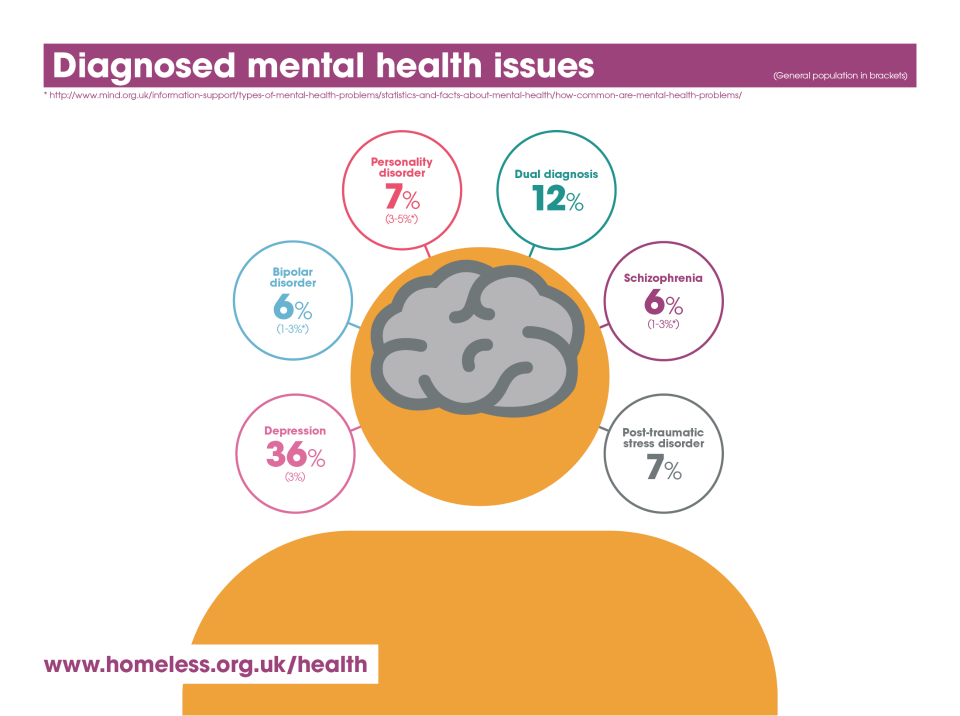Despite the advances in treatment and awareness surrounding mental health issues in recent years, mental illness still carries an enormous amount of stigma. The infographic below, published by Homeless Link UK, provides some details about the complex relationship that exists between mental health and homelessness.

Individuals with mental health issues are more likely to be homeless, as mental illness has a detrimental impact on all aspects of their life. People suffering from poor mental health find it more difficult to maintain close relationships with family and friends. Their cognitive abilities may be affected; making them more likely to misunderstand others and question the motives of members of their support network. Difficulties are also likely to arise at work, as individuals may be unable to deal with workplace stresses. Many ultimately find themselves unable to maintain employment. After looking at how having mental health issues can poorly impact an individual’s life, and understanding that these stressors can pile up, it’s clear why individuals suffering with mental health issues are more likely to be living in critical housing situations.
Homelessness on its own can cause issues in mental health. Transitioning from housing to living on the streets is an enormously stressful and difficult situation. Individuals trying to get off the streets may find that there are few employment, educational, and housing supports in place to help them with their goals. Impediments in the journey from being homeless to living in an adequate housing situation can be demoralizing and depressing. In circumstances where an individual's mental health issues have acted as a precursor to their homelessness, homelessness often only further amplifies their condition. Increased exposure to harmful drugs, poor nutrition, and difficulty accessing appropriate medical care because of homelessness are all factors that directly impact mental health. It doesn’t come as a surprise when the above infographic shows that all of the mental health illnesses represented have greater representation among the homeless than among the general population.
The discrepancy between the mental health of the general population compared to the homeless population is most pronounced when considering the incidence of depression. The survey conducted by Homeless Link revealed that homeless individuals are thirteen times more likely to suffer from depression. Although the UK was the site of this survey, these sorts of discrepancies extend beyond geographic borders. In a survey conducted by St. Michael's Hospital, 31% of the homeless population was shown to suffer from depression. This is opposed to 4.8% of the general population who suffer from depression according to figures provided by the Canadian government.
In the absence of care and support, many homeless individuals suffering with mental health issues turn to drugs and alcohol as a coping mechanism. 41% of those surveyed by Homeless Link reported such behaviour. This leads to increasing instability in their lives and may ultimately lead to concurrent disorders, a condition representing 12% of the homeless population surveyed. The term concurrent disorder refers to being diagnosed with both mental illness and a substance abuse problem. Over the course of treatment, it’s difficult for specialists to determine if mental health issues, substance abuse problems, or both are causing symptoms and behavioural problems. There is an evident need for specialized, coordinated programs and services that address this specific subgroup.
Perhaps, rather than viewing this issue from a numbers-oriented perspective, it would help us to focus on individual stories.
Martin was professionally educated and employed before his mental health issues resulted in him becoming homeless. Martin was fortunate to find the help he needed at the Mustard Seed shelter in Calgary. Like in Martin’s experience, to meet the needs of people experiencing mental health problems, a number of services are required.

